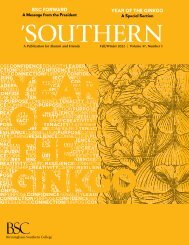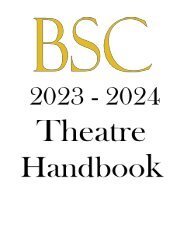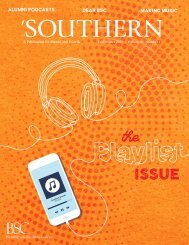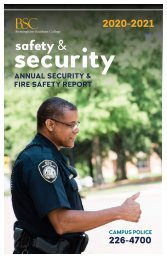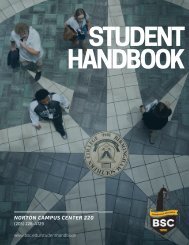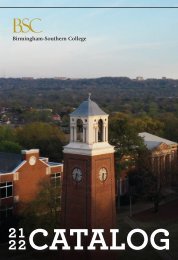Southern 2020
You also want an ePaper? Increase the reach of your titles
YUMPU automatically turns print PDFs into web optimized ePapers that Google loves.
28 / ’southern<br />
HOPE<br />
HAPPENS<br />
About three years ago, when Greg King ’96 was selected to lead<br />
the <strong>2020</strong> United Way of Central Alabama Campaign, he knew their<br />
fundraising strategy would look different during an election year.<br />
However, he had no idea that he and his team would drastically<br />
change their plans to persist throughout a global pandemic – and<br />
still support the Birmingham community.<br />
The <strong>2020</strong> annual campaign theme was “Because of You Hope<br />
Happens,” and King and his team worked hard to share how<br />
Birmingham area companies and organizations can help inspire hope<br />
throughout the community. The United Way of Central Alabama<br />
(UWCA) supports more than 80 agencies that provide services like<br />
quality healthcare, education, and financial development, and their<br />
campaign each year is crucial to funding these services.<br />
“I wanted to build a veteran team of folks who have a passion for the<br />
organization and who’ve held leadership roles in the past,” King says.<br />
“That strategy has served us well with the onset of the pandemic and as<br />
we do things dramatically different.”<br />
Before chairing the annual campaign, King has served the UWCA<br />
for years, first as a donor. He then served on the board of Pathways,<br />
a United Way agency for women and children experiencing<br />
homelessness in Birmingham, and joined the United Way board.<br />
He led the Pacesetter Campaign in 2013 and served on numerous<br />
committees, leading to his role as campaign chair in <strong>2020</strong>.<br />
“The reach and the efficiency that the United Way has throughout<br />
our community maximizes impact through each of their<br />
organizations,” he says. “I saw this early on, and I always felt that<br />
through the dollars I was able to donate, I was able to touch a lot of<br />
need throughout the community.”<br />
By the end of March <strong>2020</strong>, King and his team were preparing for<br />
visits to Birmingham workplaces, but they realized that the campaign<br />
would not operate under normal circumstances. Meetings with<br />
UWCA staff and volunteers that would have taken place over the<br />
summer and fall all went virtual.<br />
“We’ve had to completely rewrite the playbook,” King says. “But<br />
the community has been resilient. Birmingham, for a long time,<br />
has run a very robust United Way campaign, and people have really<br />
stepped up in <strong>2020</strong>.”<br />
King, executive vice president and Alabama regional president<br />
at First Horizon Bank, has enjoyed has enjoyed collaborating with<br />
campaign leaders and volunteers on creative ways to share their<br />
message virtually. For the virtual kickoff, the team partnered with<br />
meteorologist James Spann and several community partners to create<br />
the Hope Happens Network, their imitation news channel that<br />
captured more than 450 social media participants.<br />
During the campaign, the needs of the Birmingham community<br />
increased due to high unemployment rates and food shortages. King’s<br />
team saw an incredible turnout in support in response. At the end of<br />
August, the United Way wrapped their pacesetter campaign and saw<br />
an increase of nearly $500,000 in funds raised from last year’s total. By<br />
November, the team surpassed their goal of $34.5 million.<br />
“Birmingham is such a generous community and always has been,”<br />
he says. “I’ve been so proud of the team and honored to be a part of<br />
it as the needs in the community have never been greater.”<br />
Advocating for Mental Health Care Reform<br />
Bill Smith ’96 is thinking about his mental health —<br />
and yours, too — as a matter of public policy. In May<br />
<strong>2020</strong>, he launched Inseparable, a coalition organization<br />
with a simple but ambitious agenda — increasing access<br />
to care, advocating for research, investing in prevention<br />
and early intervention, and driving a comprehensive<br />
plan. That policy jargon comes out of an essential idea<br />
that mental health care is health care.<br />
“The name Inseparable comes out of a two-fold<br />
idea,” Smith says. “One is that the health of our mind<br />
is inseparable from our body. Two is that if we come<br />
together and create a political force to create a movement<br />
for change, we’re inseparable.”<br />
Smith grew up in Eufaula, Ala., in a BSC legacy family.<br />
“My older brother Jack went to Birmingham-<strong>Southern</strong><br />
and my father was a Methodist delegate to the board,”<br />
he says. His niece Sutton Smith is BSC’s <strong>2020</strong>-21 Student<br />
Government Association president.<br />
If BSC has awarded a few hundred degrees in political<br />
science in the last 30 years, dozens of those former polisci<br />
majors became lawyers and judges, or zigzagged into<br />
careers unrelated to politics or science. Smith did none of<br />
those things.<br />
“I used to joke with Natalie Davis that I’m one of<br />
the few people with a political science major who<br />
actually does politics,” Smith says. “I went straight into<br />
campaigns and elections right after school.”<br />
His first job was on a multimillion-dollar Alabama<br />
Supreme Court campaign that he described as “a baptism<br />
by fire into politics.” Campaigns are, inevitably, partisan,<br />
but as his career advanced, Smith discovered that the<br />
work that meant the most to him centered on policy.<br />
“I figured out that I cared about issues a lot more<br />
than I cared about politicians,” he says. “Not that<br />
there aren’t some good politicians. I wouldn’t be<br />
working in the system if I didn’t believe there were.<br />
But it’s a lot more rewarding to work for causes than<br />
to work for candidates.”<br />
Smith started out working for Republicans, became<br />
an independent, and then ultimately a Democrat.<br />
In 2004, he became the political director of the Gill<br />
Foundation, a funding organization that works to<br />
secure full equality for lesbian, gay, bisexual, and<br />
transgender people.<br />
“I spent years and years taking the skills I’d learned<br />
from the campaign and election world and applying<br />
them to the fight for marriage equality,” he says.<br />
The effort demanded a combination of philosophical<br />
commitment and practical action. Smith, who describes<br />
himself as “a social justice Methodist,” attributes a lot of<br />
his drive for such work to his time on the Hilltop.<br />
“The idea of service to causes bigger than yourself<br />
—that was fairly well planted in me at Birmingham-<br />
<strong>Southern</strong>,” he says. “We put together the hearts-andminds<br />
work that we needed to do to move the needle on<br />
marriage equality, but we also put together the political<br />
power that we needed to win a public policy battle.”<br />
Mental health is his second front, but his background as a strategist accounts for<br />
only part of his purpose. Two years ago, Smith’s brother Abb Jackson “Jack” Smith II<br />
‘93 died by suicide.<br />
“It was devastating for my entire family,” he says, “but the thing is, there are<br />
millions of families that are devastated by this.”<br />
In his grief he reflected on what it took to build a political movement.<br />
“When we were starting Inseparable, what we saw and wanted to tap into is that we<br />
really need a mental health care system that allows us to all take better care of each<br />
other,” he says.<br />
The hands-on tactics to create such a system expanded access through parity,<br />
integration, and workforce development. In other words, mental health care should<br />
be affordable, widely available in community and clinical settings, and provided by<br />
professionals who can reach under-served populations.<br />
At the helm of Inseparable, Smith is continuing work that his brother started. Jack<br />
was a journalist and blogger who wrote hundreds of stories about depression and<br />
mental health.<br />
“He was somebody who believed that you can make a difference in the world,”<br />
Smith says. “I’m confident that he would be very happy with me doing the work that<br />
I’m doing.”<br />
A GROWING COALITION<br />
In addition to Bill Smith, Inseparable’s leadership includes co-founder Zak Williams,<br />
son of the late actor and comedian Robin Williams, who died by suicide in 2014,<br />
and a broad and diverse advisory board — medical practitioners, recovering addicts,<br />
people with personal or family experience of mental illness. “As we built out the<br />
board, it was intentionally a diverse group of people who are grounded not just in the<br />
science and policy, but also in the reality that everyday people face around mental<br />
health,” Smith says.<br />
Learn more at inseparable.us.<br />
FALL/WINTER <strong>2020</strong> / 31


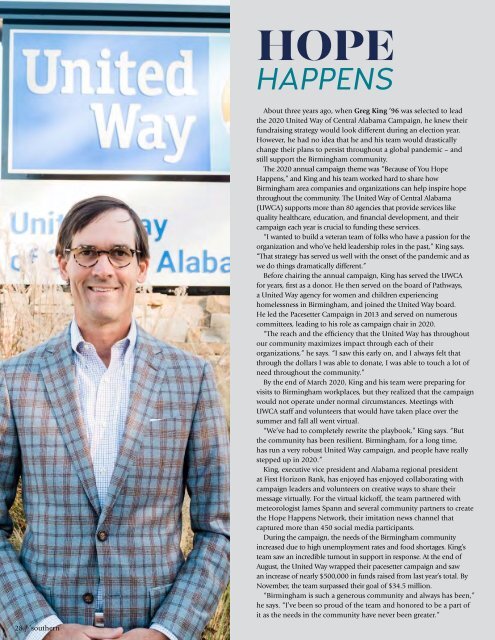

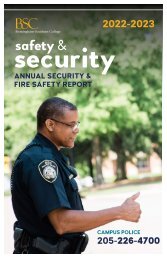
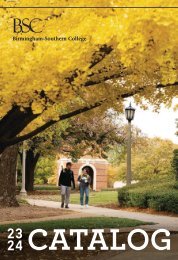
![2023-2024 BSC Catalog Updated_UG ONLY_FINAL[82]](https://img.yumpu.com/68414854/1/178x260/2023-2024-bsc-catalog-updated-ug-only-final82.jpg?quality=85)
